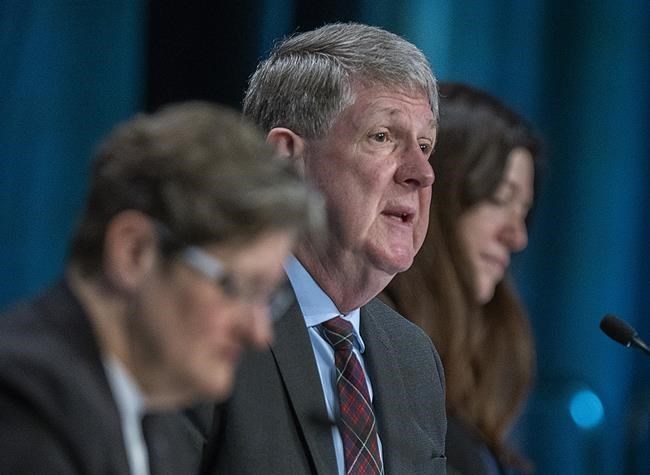HALIFAX — Two lawyers are criticizing a decision Tuesday to allow senior RCMP witnesses to avoid cross-examination before the inquiry investigating the 2020 mass shooting in Nova Scotia.
The lawyers, Tara Miller and Josh Bryson, represent relatives of some of the victims gunned down by a killer disguised as a Mountie and driving a replica RCMP cruiser on April 18-19, 2020.
The federal-provincial commission of inquiry has agreed to provide special accommodations for three senior Mounties when they testify about command decisions they made as the tragedy unfolded.
Two of the Mounties, Staff Sgt. Brian Rehill and Sgt. Andy O’Brien, will face questions from commission counsel via Zoom calls that will be recorded and broadcast at a later date. Participants and lawyers who wish to observe their testimony must remain off screen with their microphones muted while each Mountie is speaking.
No reasons were given for the special arrangements as this information is considered private information that typically deals with physical or psychological health needs, the commission said.
Miller said she disagrees with the decision not to allow direct cross-examination.
"It will erode trust in this process and the evidence that will come out of it for these key witnesses," said Miller, who represents a relative of Kristen Beaton, a nurse and pregnant mother who was fatally shot while sitting in her car in Debert, N.S., on April 19, 2020.
Last week, the Nova Scotia RCMP issued a statement saying the inquiry would be violating its own rules if Mounties who endured trauma were called to testify without some form of accommodation. The inquiry's mandate calls for it to adopt a trauma-informed approach.
Bryson said he could have cross-examined Rehill and O’Brien without causing trauma. "I'm very disappointed in the ruling by the commissioners to be removing our meaningful participation in the evidence of these two key participants in this inquiry," he said.
He said Rehill is the "most integral witness to this inquiry," as he was the first critical incident commander to oversee officers dispatched to Portapique, N.S., where 13 people were killed on the night of April 18, 2020.
Rehill was the RCMP's risk manager at its Operational Communications Centre in nearby Truro, N.S. When the centre received 911 calls confirming an active shooter was on the loose, Rehill immediately assumed command.
“He (Rehill) made the key decisions,” Bryson said in an interview Tuesday, adding that the senior Mountie should face questions about what he did to contain the killer on the first night.
As well, Bryson said Rehill should be asked about why there was confusion over who was in charge, given the fact that O’Brien and another Mountie — Staff Sgt. Al Carroll — were also issuing orders over the police radio that night. Though he was off duty and had consumed four alcoholic drinks, O'Brien retrieved his portable radio from the detachment — with the help of his wife — and joined in offering direction to responding officers.
According to the commission, participating lawyers such as Bryson and Miller will be asked to provide questions for Rehill and O’Brien by Thursday at 4 p.m. The commission’s lawyers will then plan their questioning, which is expected to take place on Monday and Tuesday, beginning with Rehill.
Once that round of questioning is completed, participating lawyers will be asked if they have any further questions.
Meanwhile, Carroll — former district commander for Colchester County — is expected to testify Thursday via a live Zoom call. He will be provided with breaks during his appearance, the commission said Tuesday. He could face direct cross-examination.
The National Police Federation and the federal Department of Justice had requested that O’Brien and Rehill provide their information by sworn affidavit and that Carroll testify in person with questions asked only by commission counsel.
The commission confirmed Tuesday it received a total of six requests for accommodations. One request was rejected and the commission agreed that two other witnesses could testify as part of a panel. Those witnesses were not named.
"Accommodations are intended to ensure that the commission receives the best information possible from witnesses," the commission said in a statement. "Since witness accommodation requests involve sensitive personal health information, the commission will not share any specific individual private information about these requests."
On April 27, the commissioner leading the inquiry, Michael MacDonald, issued a decision saying RCMP Const. Vicki Colford could provide a written affidavit instead of testifying in person.
This report by The Canadian Press was first published May 24, 2022.
Michael MacDonald and Michael Tutton, The Canadian Press
Note to readers: This is a corrected story. A previous version stated that participants who wish to observe Staff Sgt. Carroll’s Zoom testimony must remain off screen with their microphones muted. In fact, those rules apply to Sgt. O'Brien and Staff Sgt. Rehill.



